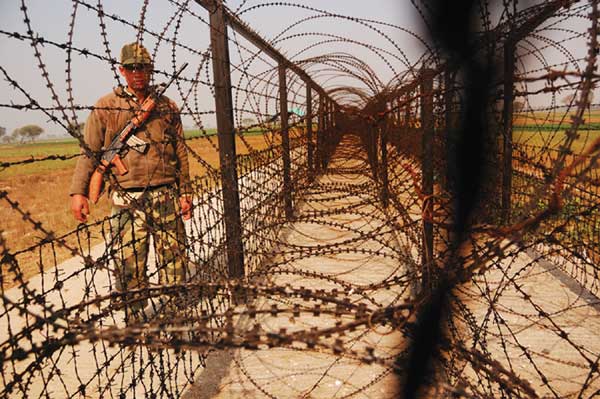
The Govt of India, in the exercise of the powers conferred by sub-section (1) of section 129 of the Border Security Force Act, 1948 (47 of 1968)”, has extended BSF’s jurisdiction to 50 km in Rajasthan, West Bengal, Assam and Punjab where earlier it was 15 km. Some of the States like Punjab is saying this to be an attack on federalism. Similar or even harsher tirade is likely to emerge from West Bengal.
This is ridiculous to think when there was a jurisdiction of 15 km for the BSF for its operations in Punjab all along, it was fine, Once it is extended to 50 km, it is hurting the federalism. Does federalism mean that the border guarding agencies are not given adequate power or is it just a desperate attempt to woo the secessionist forces in Punjab just before the State election?
The problem emanates from the mistaken belief thatIndia is a true federal country. As per the Constitutional scheme of the things, India is an Union of States that has some federal features like bicameralism, division of power and three i.e. Union, State and Concurrent lists of subjects for making laws. India is not a ‘coming together federation’ like USA but a ‘holding together federation’ like Spain. Most of the features of the Constitution indicate towards an unitary nature of the country. The Centrehas an overriding power in the Constitution to make any law under Concurrent List and enforce it whether the States like it or not. These facts are known at the entry level of politics in India. Still we have Chief Ministers calling every action of Centre as an attack on federalism.
The bigger issue here is the division of the policing power of States and Centre. This has a British legacy wherein the Princely States were allowed to enjoy the day to day authority on law and order within their States and British were more interested in the revenue and trade. After Independence, continuing with Govt of India Act 1935, the States were allowed the power of maintaining law and order. This was to be carried on as per the provisions of Cr PC and IPC.In course of time, new challenges to the national security emerged leading to the enactment of Special Acts. It necessitated certain offences to be investigated by the central agencies. Many of these Special Acts do not strictly follow Cr PC and have special provisions in the Act itself, Accordingly, thecentral agencies were invested with extra powers under Special Acts like Passport Act, NDPS Act, Customs Act etc. The recent extension of jurisdiction of BSF has been made keeping this evolution in mind.
There is no secret that the State police is hopelessly politicised and under pressure too. In many States, where two parties come in power alternately, the police force is divided with their respective loyalties to one or other party. This explains why there is anen mass transfer of police official after a new Govt is sworn in a State?
This is not the case with the Central Govt. The Chiefs of Central Police Organisations are not changed after the coming of a new Govt at Centre.More or less, the central police agencies are independent except the ‘caged parrot’ CBI which has multiple instances of being a tool at the hands of the party in power at Centre. There are also serious allegation of bias against the agencies like Income Tax and ED probing economic offences of the people owing allegiance to opposition parties. In spite of these aberrations, the central forces are seen to be impartial and even relied upon to ensure the peaceful conduct of General Elections.
The recent times have witnessed serious confrontation between the central police agencies like CBI, NIA, NCB , CRPF and BSF on one side and the States police on the other side particularly in those States where the party other than the one in Centre is in the Government. The central police officers are not accorded any courtesy, not cooperated and sometimes even harassed by Statepolice. This has reached a point of absurdity now. Recently Maharashtra Police filed a case against the Director of CBI and has summoned him. The NCB officials handling Aryan Khan Drug case are allegingof being followed by Maharashtra Police, Every army movement in West Bengal is break down of federal structure as per the statement of its Chief Minister. The CRPF cover is required for Central Police officials to carry out its duty in West Bengal.
It does not end here. The States police indulge in full scale war too amongst themselves. During the lockdown –1, the Rajasthan and Haryana Police fought at the Dharuheda border. Fortunately there was no casualty. Recently there was an armed conflict between Assam and Mizoram Police killing five Assam police personnel.
This brings us to the main issue. Under these circumstances, can the matters of national security be left in the hands of States? The answer is a big NO. This is not negotiable. So if an additional power to the organisation like BSF is given, it is a welcome step. The BSF is the pride of the nation and our first line of defence. They serve the country in the conditions that politicians can’t even imagine. If extending any power to BSF for its operational efficiency is an attack on the States’ misunderstood federalism, then let it be so. There can be no compromise on this matters whatsoever the political clowns in the States say.




